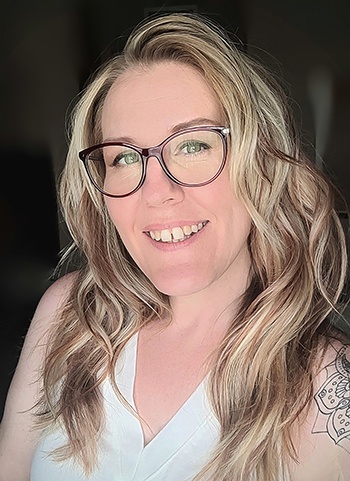
For this month’s NAPT Member Spotlight, School BUSRide spoke with Jennifer Durno, director of transportation for the Trumbull County Board of Developmental Disabilities in Niles, Ohio.
Please introduce yourself and tell us about your district.
I am Jennifer Durno, this is my 19th year in pupil transportation. I am currently working for the Trumbull County Board of Developmental Disabilities. We are located on the Northeastern border of Ohio and Pennsylvania. Our school, Fairhaven, provides educational services specifically designed for students with intellectual and developmental disabilities. Only about half of the County Boards in Ohio still operate school programs. We are proud that the Trumbull County Board of DD has one of the largest education programs in the state. We have about 250 to 300 students and we transport about 160 to 170 of those. We do transportation countywide through the 625 square miles of Trumbull County, Ohio.
What is the most pressing challenge for your district’s transportation department?
As with everyone, staffing. We transport all special needs students, so not only do we need a bus driver on every bus, but we also need to have an aid on every bus. Staffing both of those positions has been a struggle over the last few years, especially with the students that we transport and the accommodation that they require. Three quarters of our students have safety seating accommodations. We are required to fill all the accommodations by the IEP, so we are always looking for people that can fulfill that obligation.
Coming from a county board of DD can be a different world than some of your regular local districts. Most of the time we are a smaller school, but travel more miles per route. We can have students on our buses for up to 90 minutes. We have students that have detailed medical plans that we coordinate with our nursing staff. It’s a big change for the driver who come to us from regular education school districts.
I have worked for a district, I have worked for county boards and I think that sometimes we are a little bit forgotten. There are a lot of opportunities through the federal and state departments of education for funding that we as county boards do not qualify, so we really have to be creative working within, not only our organization, but our local communities to provide the best support we can for our students and staff.
Just knowing that it is a bit of a different world and we are here and we are really proud of the work that we do and the safety of our students is utmost for us and we love doing what we do.
How are you seeking to solve this challenge?
Recently we have really focused on marketing our Organization and our department positions. That and really addressing some of the general concerns of new staff. It is expensive to become a school bus driver, especially if you are starting off with absolutely no credentials. It can be intimidating so we really wanted to address that aspect of the process. We have a wonderful leadership staff here with my Assistant Director and Training Coordinator, both being OBIs. They will sit and discuss the process, how it works starting at the interview level, explaining to applicants that they may come in as a bus aide initially, but we can discuss driving and see if it is something they would be interested in. We try to take away some of the fear of operating such a large vehicle and explain the process really well. We also offer to help them study for their permit test. We train them for the CDL and Ohio Pre-service Certificate, making sure they are comfortable and confident before they take their test.
As an organization, we have addressed the cost issue by paying for the training and the pre-service classes that are offered through the state of Ohio. That has really helped. I think when you are just coming off the street to become a driver and you see how much training it takes, the cost can be daunting. We do not want anybody to come in and have those fears and nerves affect their success, so really walking them through the process has helped them be successful.
As a seasoned professional, what advice can you offer other NAPT members?
Never asking your staff to do something that you do not know how to do or will not do, and to be open to changing things that are not the best fit for department. That has been the success in our department here and throughout the different districts and organizations that I have been in. I am a school bus driver, I am certified to go out and drive the bus if we are shorthanded. Knowing firsthand what they encounter on the roads and being able to answer those questions from practical experience, is very important. This builds trust in your relationship with your staff. We cannot always do the same thing over and over. I always tell my staff the most dangerous phrase in the English language is, “We have always done it this way.” We do not live by that here. We constantly take feedback from the staff that are doing the job every day, and if there is a way to do it better, we make that change and implement it as soon as we can.
Also, you need to have a great relationship with your schoolteachers and your special education directors, and/or leadership, so that they understand what you are going through. Have them come and sit with you, have them see what you go through every day and see why you are making the decisions that you are making for the safety of the student’s transportation. Building that trust and that relationship with the school is very important as well. We have a great one here with all our Fairhaven staff.
What can the NAPT organization do to best help you?
The classes that they offer have been absolutely wonderful. I am currently in the process of obtaining my certification for Certified in Special Needs Transportation and Certified Director of Pupil Transportation. I think that their courses are so valuable. It would be great to be able to extend those classes to staff that are not going through the certification process and maybe extend that outreach a bit. Having that training and those classes offered to a wider variety, maybe not just NAPT members, is valuable. I just did a webinar with active shooter training, and I was able to log on and have some of my staff watch that with me, and they were really wowed with that type of availability of training because we do not get that kind of stuff in a smaller little district. That kind of accessibility would be great.
They do such a wonderful job advocating for all the small districts. We are small here. We have 170 kids, I run 12 buses, but they really do make you feel like you are as important as a larger school district that might be running hundreds and hundreds of buses. I think that is really important. I have really valued my time being a member of NAPT. The conferences are fantastic, and I cannot wait to continue that relationship.
What are you most excited about for the return of the NAPT Conference and Trade Show?
The previous years I have attended, I have really concentrated on the coursework for the certification, so I am very excited this year to see what some of the other presentations are. It seems right now they have a great agenda happening. It is hard sometimes because there is so much to choose from, but that is what I am really looking forward to, some of the different presenters.
Because I am so special needs focused, I feel that sometimes there is a lack of awareness, training and presentation from those experts that could bring a practical application. We get a lot of federal motor vehicle standards telling us what we have to do. I think having a bus seat with a safety vest available while demonstrating how it’s secured and why we use it, would be a great resource for not only special needs professional, but regularly distract that integrate their students on their buses. I am also a certified CPST, a Child Passenger Safety Technician, so I would really love to see something even statewide and with the OAPT and NAPT, if they would work together to bring that piece into it. That would be a great aspect and it would be really interesting to see that type of hands on training.


